Alpha Generation: The Search for the Unexplainable
Equity Market Neutral Strategies Stripped
February 2021. Reading Time: 10 Minutes. Author: Karl Rogers & Nicolas Rabener.
This research note is a joint effort of ACE Capital Investments & Finominal.
SUMMARY
- The performance of equity market neutral hedge funds, both discretionary and systematic, can be fully explained by market beta and equity factors
- At their peak, systematic managers brought in twice as much unexplained returns versus their discretionary counterparts, however, their factor loadings explain this difference
- Given that we understand their performance drivers, these can be replicated efficiently
INTRODUCTION
We began this research effort on the hypothesis that one can use an equity market neutral strategy to either a) isolate exposure on idiosyncratic risks or b) isolate exposure to equity factors like Value or Momentum. The latter is steeped with academic research and readily available as long-short risk premia products from investment banks. The former is filled with the unknown and is highly desirable for portfolio diversification, but as one can imagine, is difficult to generate for hedge fund managers.
A relatively simple definition of alpha is the return driven in an unrelated fashion to one’s benchmark. Capital allocators have greater access to cheap strategies, markets, and risk types due to the boom in passive investing products. Although these make reducing returns down to the bare bones much easier as we can strip out more risk exposures, the transparency makes the active manager’s job significantly more challenging. The goal of all active managers is to provide, from a quantitative perspective, alpha. This represents the unexplainable returns once stripped of various loadings.
Allocators look for a large portion of a fund’s return to be alpha. Otherwise, why pay high active management fees?
In this short research note, we analyse the returns of equity market neutral hedge fund managers, both systematic and discretionary, to study how much alpha they are generating and whether we can explain what is driving their returns.
SYSTEMATIC EQUITY MARKET NEUTRAL PERFORMANCE STRIPPED
We are using a proprietary data set of equity market neutral hedge funds (EMN) that are classified as either discretionary or systematic based on the funds’ descriptions. A significant number of these funds either stopped existing or are no longer reporting returns, which means the data set features survivorship bias (read Market Neutral Funds: Powered by Beta?).
For this analysis, we conducted a two-stage return decomposition. First, we regressed the systematic EMN index’s returns against the returns of the S&P 500 and removed the market beta; we call this the Net of Market Beta Index. We then ran a multiple linear regression using common equity factors, namely Value, Momentum, Quality, Size, and Low Volatility against this index. This then leaves us with what we call the Alpha Index and represents the unexplained returns. Stated differently, it is the alpha generated by the hedge fund managers’ net of market beta and equity factors.
Intuitively, we would expect the equity market neutral index to have no relationship with market beta given their objective of offering uncorrelated returns. Capital allocators would hope to find the majority of returns coming from equity factors given that these are systematic funds, or better, represent true alpha.
As shown in previous research notes we have published, the EMN index has generated a significant portion of its returns from simply providing exposure to the stock market. At its peak in 2018, alpha accounted for a little under a third of the EMN index’s return s. However, the alpha generation turned negative thereafter and essentially was zero over the entire period between 2011 and 2020.
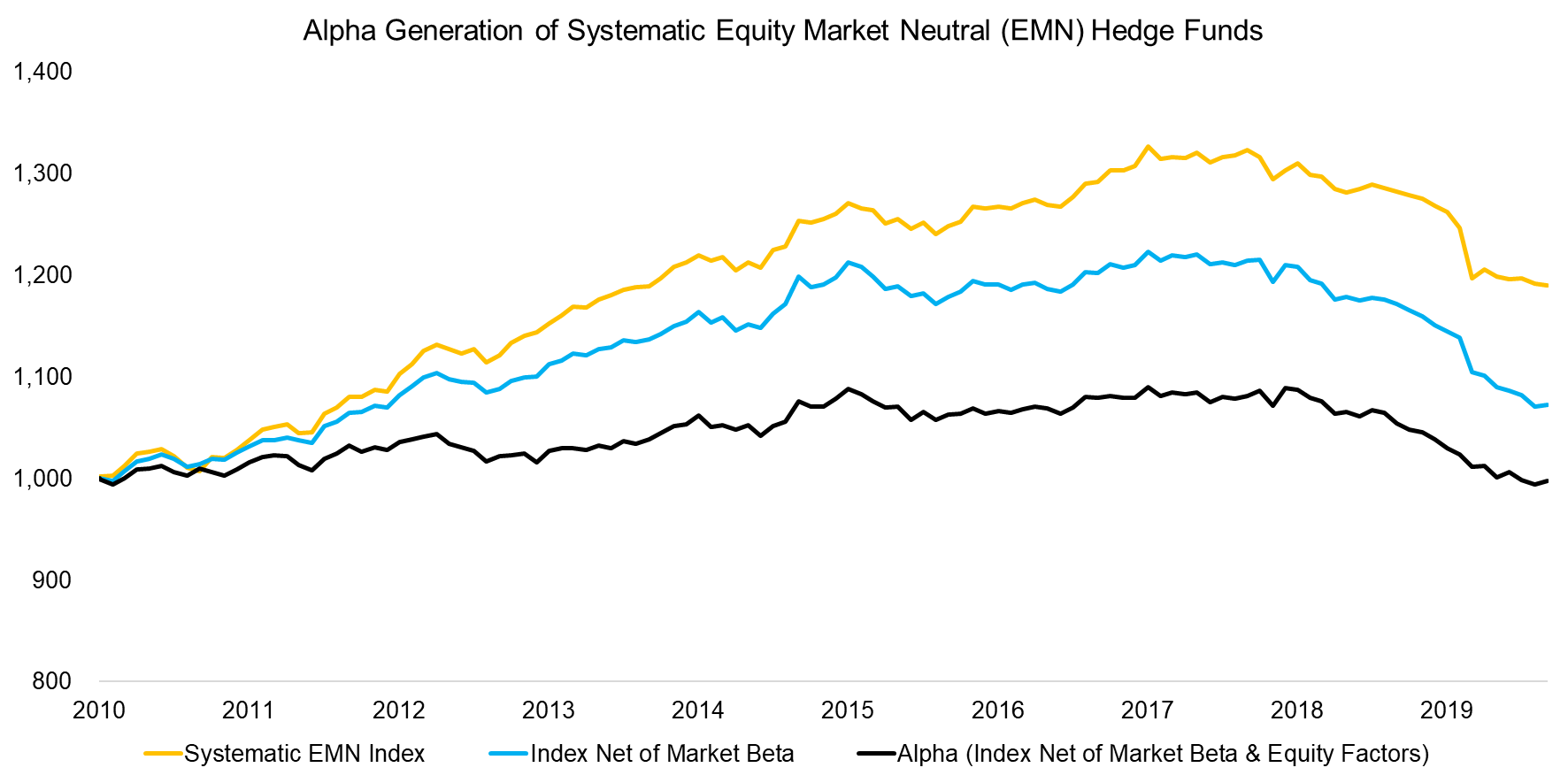
Source: ACE Capital Investment, FactorResearch
DISCRETIONARY EQUITY MARKET NEUTRAL PERFORMANCE STRIPPED
The Discretionary EMN Index was run through the same process as its systematic brethren to calculate its Net of Market Beta and Alpha indices.
Once again, undesirably, we observe that market returns contributed a large portion to the Discretionary EMN Index returns. Furthermore, equity factors explain even more of the returns than for systematic funds, which is somewhat ironic given that discretionary managers do not tend to invest quantitatively. The total alpha generated across the observation period of almost a decade was zero.
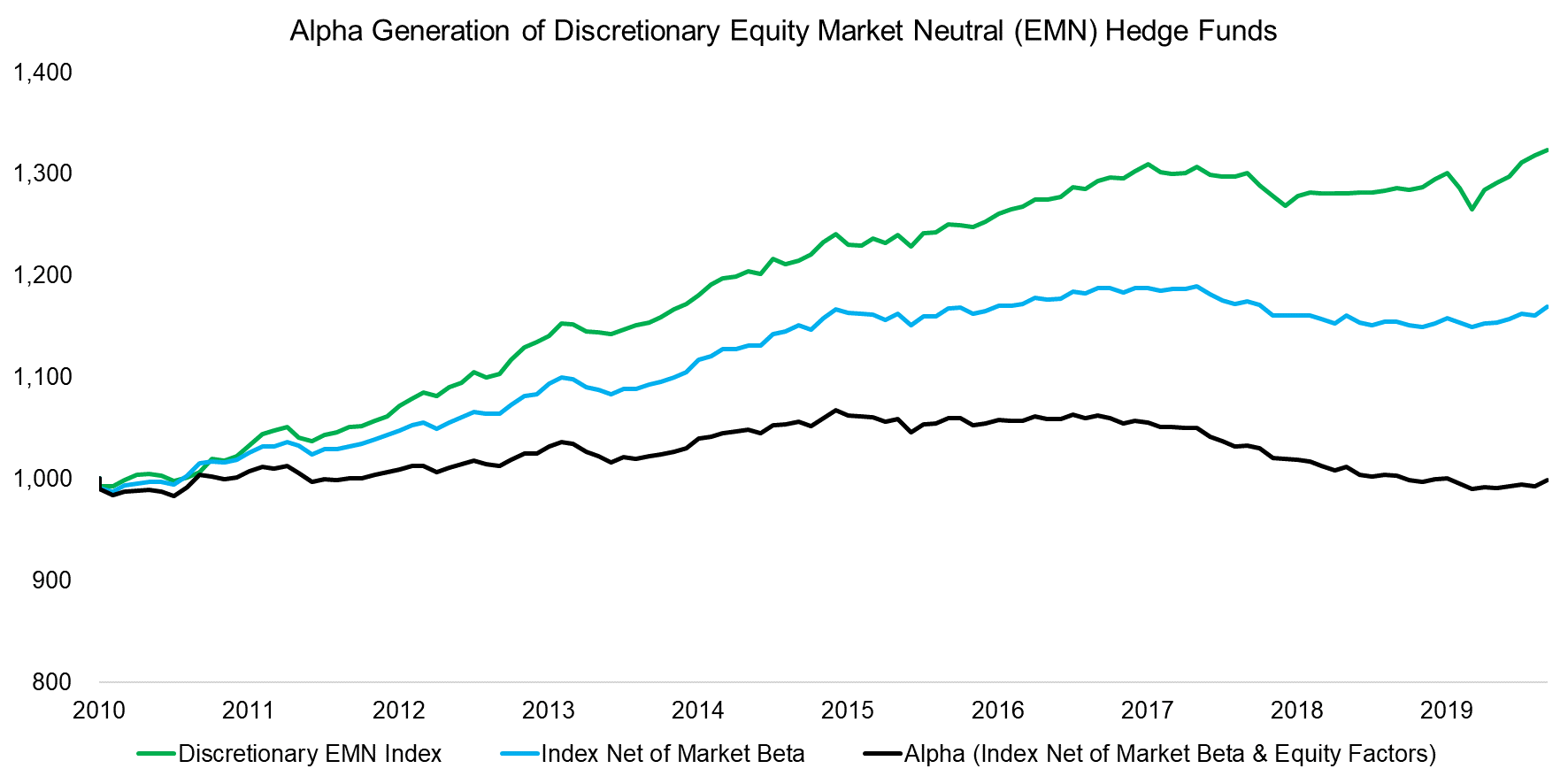
Source: ACE Capital Investment, FactorResearch
PERFORMANCE ANALYSIS
To further analyze the performance of the EMN indices, we break down the factor loadings of the return stream to get a sense of what specifically has been driving each index.
Intuitively, we would expect a greater relationship with equity factors for systematic hedge fund managers over discretionary managers given the more academic-centered and data driven investment process. After running factor loadings on the Net of Market Beta Index for each investment process, we found that this theory is true with Value, Momentum, and Quality having roughly double the weighting for systematic managers versus discretionary managers.
Given that Value has significantly underperformed over the last decade and systematic managers had a high exposure to that factor explains a significant part of their poorer performance relative to the discretionary managers.
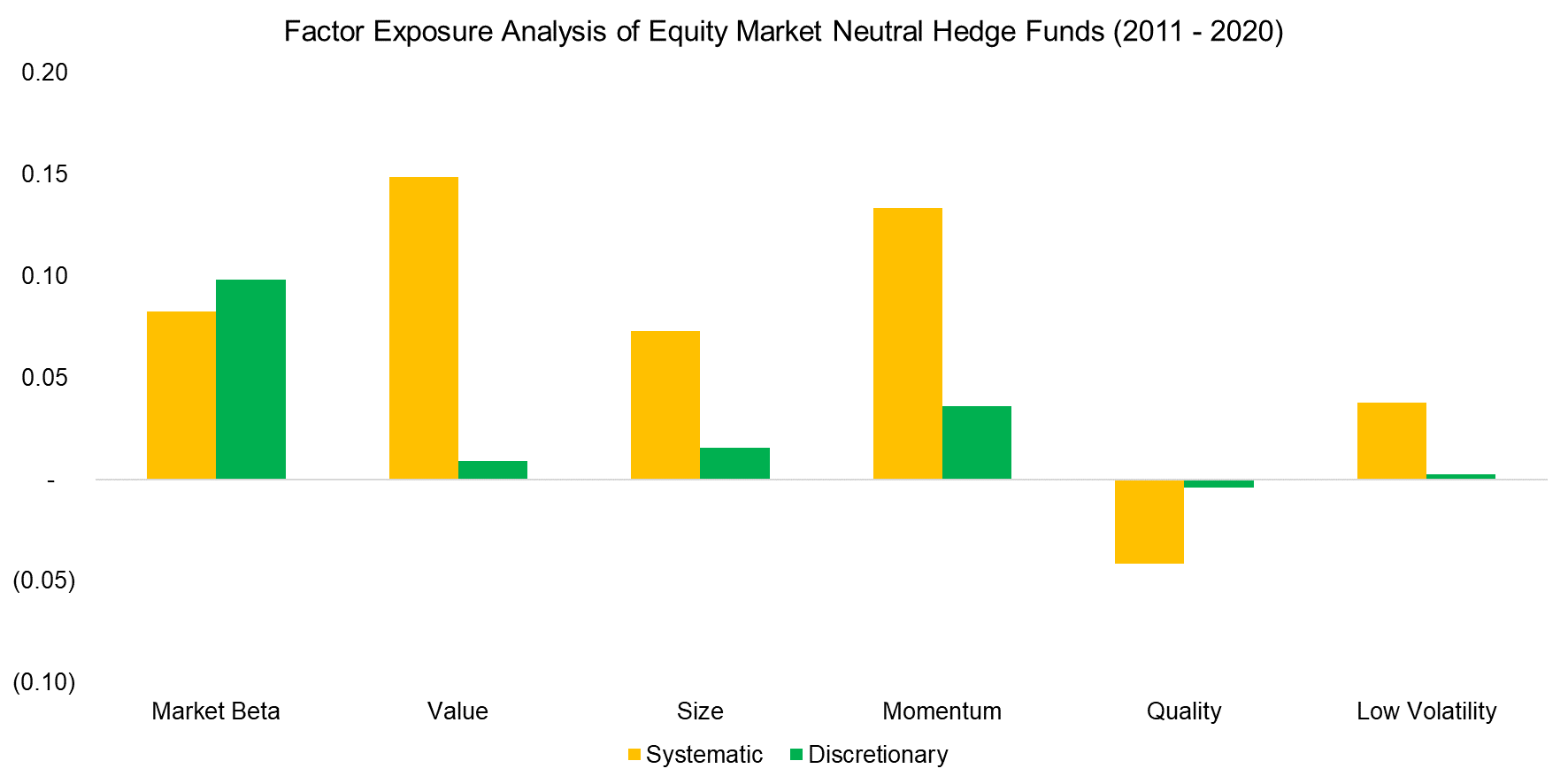
Source: ACE Capital Investment, FactorResearch
Although the alpha generation was essentially zero, these hedge fund strategies can still be valuable if they provide greater risk-adjusted performance than the alternative.
Therefore, we calculated the Sharpe ratio of the various indices for the period from 2011 to 2020. The discretionary managers provided better risk-adjusted performance than the S&P 500 while the systematic managers produced a worse risk-adjusted Sharpe than the S&P 500, which can primarily be contributed to the divergence in performance in 2020. Given that the alpha was zero for either type of fund manager, the Sharpe ratios are zero.
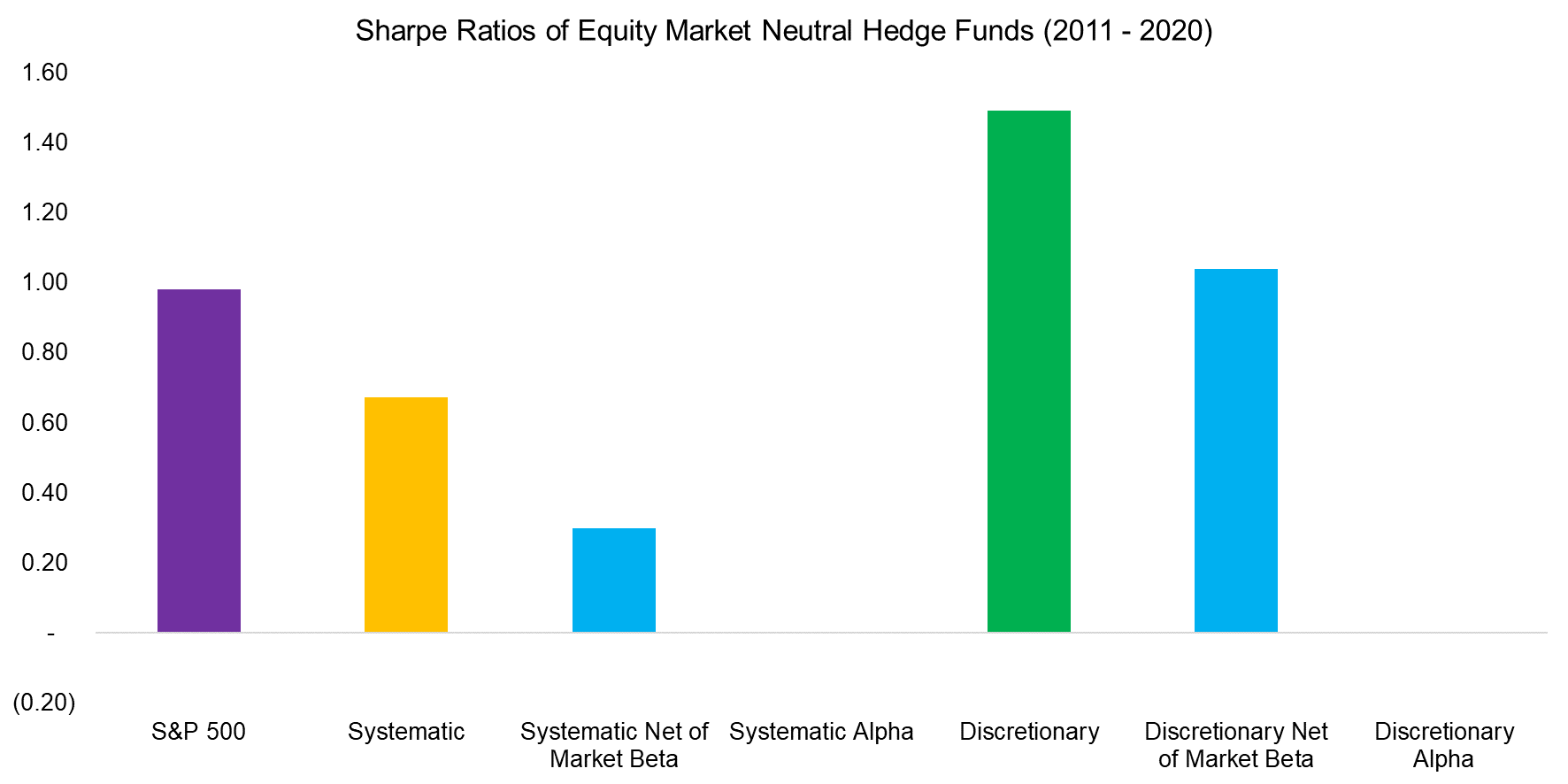
Source: ACE Capital Investment, FactorResearch
INDEX REPLICATION
Given the explanatory power of both the S&P 500 and equity factors on the EMN indices, we can create replication indices using the betas. The first replication index allocates 15% to the S&P 500 and 85% to an equal-weighted long-short multi-factor equity portfolio while the second one allocates 15% to the S&P 500 and 85% to cash (read Replicating Famous Hedge Funds).
We observe that these simple replication indices exhibited the same performance trends as the Systematic and Discretionary EMN indices, which questions the diversification benefits and alpha generation that these hedge fund managers aim to provide. Capital allocators can replicate these indices easily themselves and avoid paying management and performance fees as well as the complexity of hedge fund due diligence and monitoring.
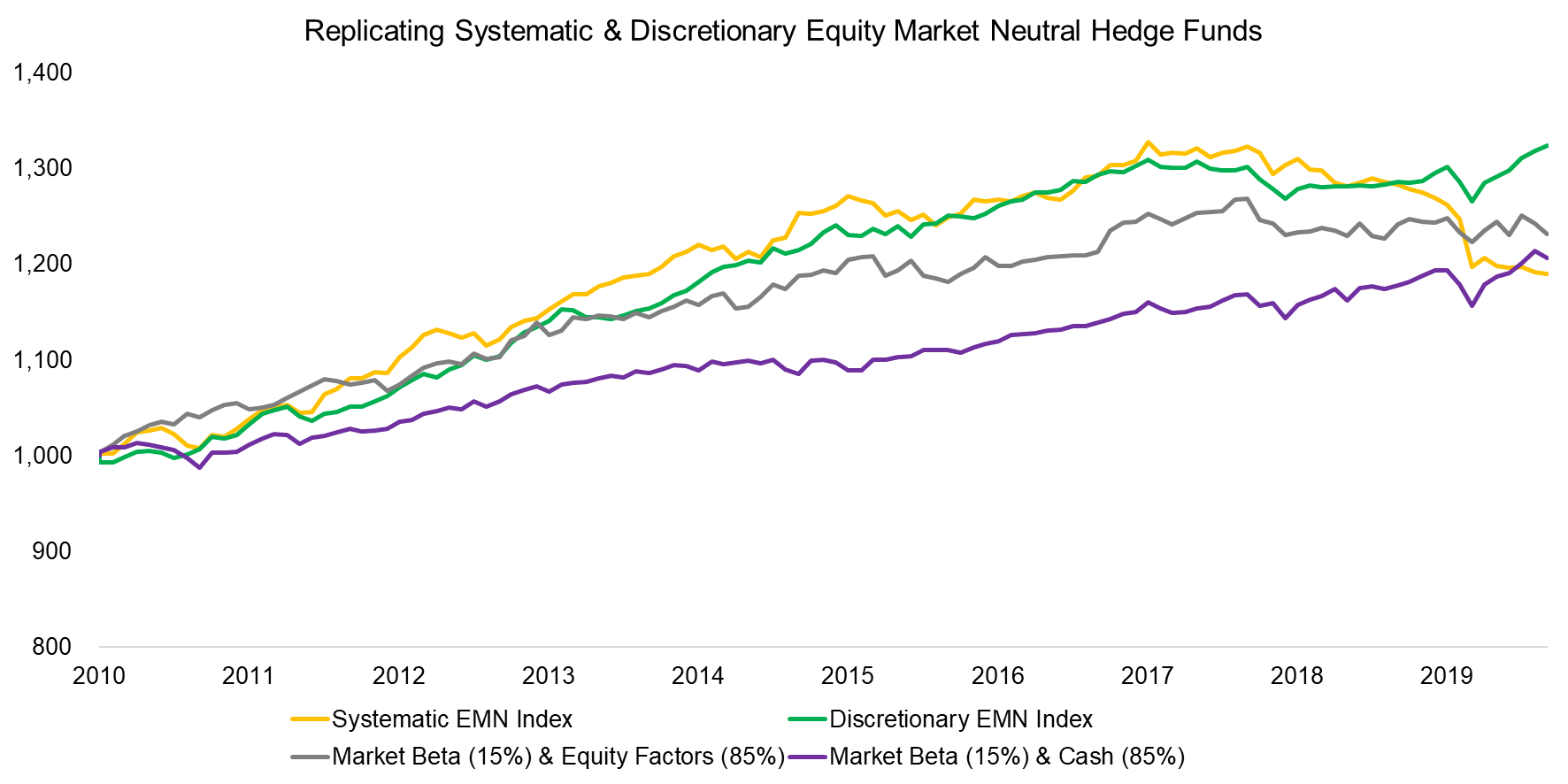
Source: ACE Capital Investments, FactorResearch
FURTHER THOUGHTS
It is worth mentioning one caveat to the research above: the analysis is based on indices and therefore we are just looking at the average hedge fund’s performance. There will be both winners and losers within the indices that produce more and less alpha versus what the average fund does.
We have previously shown that neither discretionary and systematic hedge fund managers offered performance consistency when contrasting in-sample and out-of-sample returns. However, capital allocators continue to invest billions in a few highly successful hedge funds like Citadel and Millennium. It would be interesting to explore their returns and understand what has been driving them. Is it alpha, or just market beta and factor exposure again?
A further interesting area of research is the relationship between alpha generation and stock market volatility. Fund managers frequently comment that they require volatility to generate alpha, but that does not seem to be supported by the data. In contrast, when volatility spiked during the COVID-19 crisis in early 2020, both types of equity market neutral strategies lost money. Naturally, this is not desirable to capital allocators as that is when portfolio diversification is needed the most.
RELATED RESEARCH
Hedge Fund Battle: Discretionary vs Systematic Investing
ABOUT THE AUTHORS
Karl Rogers is the founder of ACE Capital Investments, an Irish-based alternative investments consultant, which specializes in niche, capacity-constrained hedge funds that diversify family office portfolios from their traditional asset class investments. Karl is also the Head of Trading, US Power for RISQ, where he is responsible for building out the proprietary US power trading desk and sits on the firm’s risk committee. Karl also sits in the adjunct faculty for Trinity College Dublin’s M.Sc. in finance program where he is both a guest lecturer in their alternative investment module and supervises the student’s theses. Karl is a market contributor across various industry platforms including CAIA, AlphaWeek, Family Capital Publishing, and the FM Report. He an alternative investment conference speaker and hedge fund panel moderator. Karl has macroeconomic research published by a top-tier academic journal and is a former hedge fund manager and commodity trader across Ireland and North America.
Connect with me on LinkedIn.
Nicolas Rabener is the Founder of Finominal, which empowers investors with data and technology to analyze and improve their portfolios. Previously he created Jackdaw Capital, an award-winning quantitative hedge fund. Before that Nicolas worked at GIC and Citigroup in London and New York. Nicolas holds a Master of Finance from HHL Leipzig Graduate School of Management, is a CAIA charter holder, and enjoys endurance sports (100km Ultramarathon).
